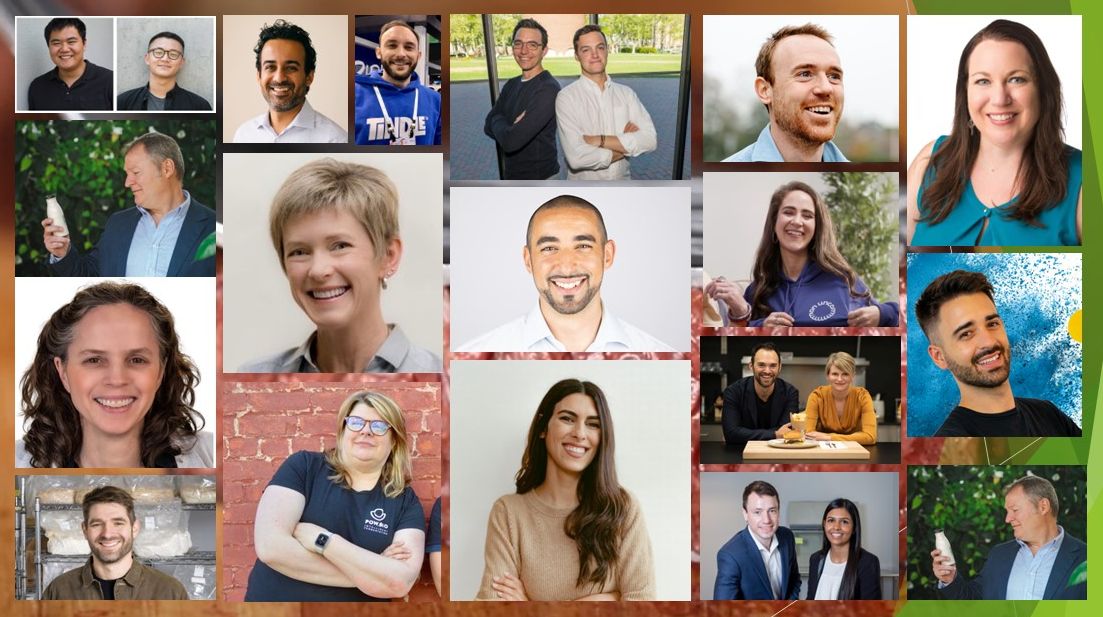As we approach 2024, what is keeping agrifoodtech startups awake at night? To find out, foodtech editor Elaine Watson fired off a few emails to companies she’s covered on AgFunderNews this year (apologies if you weren’t contacted, next year this will be more systematic 😉) to get a sense of what is disrupting their sleep, with a particular emphasis on the alt protein space.
Unsurprisingly, the current challenging funding environment, hiring issues, regulatory hurdles, and souring media and consumer sentiment around foodtech were high on the list, although several founders pointed out that stress just goes with the territory if you’re running a startup.
At on-farm fertilizer production startup NTP Technologies, says founder John Ireland, “We have a saying: ‘We sleep like babies, up every two hours crying.’ If all the things I worry about kept me up,” he observes, “I would never sleep.”
Hopefully we haven’t killed your buzz with this piece, but if you’re feeling depressed, check out part two of this vox pop when we focus on what what founders and CEOs are excited about as we head into 2024…
Todd Beckman, CEO, Verb Biotics: One of the biggest challenges to the development of new, functional next generation probiotics and postbiotics is the onerous regulatory path for new biologicals. The requirement to show testing in animal toxicology models is antiquated, expensive and time consuming, and these studies often have limited correlations to human safety. As a result, many players in the industry walk away from finding truly functional, novel strains and instead opt to find mediocre effectiveness from strains that are already GRAS [Generally Recognized as Safe].
John Ireland, founder and CEO, NTP Technologies: Our short-term concern is funding. Pre-revenue companies are high-risk, and it seems more capital is going towards lower risk projects. Not many venture groups are willing to invest small amounts of money in high-risk endeavors, which forces us to speak with angel investors. However, angel investors appear to be risk averse currently causing a shortage of available funds to companies that are very early in their journey.
Dr. Hermann Tribukait, cofounder and CEO, Atinary Technologies: Scaling the team while maintaining the culture of the company and deploying our technology at scale are top of mind at the moment. As we experience a rapid expansion, it is crucial to identify individuals who not only possess the right skills, but also match the values, passion and vision of Atinary.
Mariah Scott, CEO, Rantizo: Agtech needs to demonstrate the value it is delivering and promote the wins for growers. There is skepticism about Big Tech, uncertainty about changes in the regulatory and political environment, and too much data for data’s sake. We—ag tech companies in general, and Rantizo– need to focus on how we solve a problem and show that value.
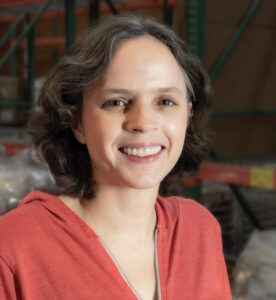
Christie Lagally, founder and CEO, Rebellyous Foods: The purpose of meat replacements is to address the significant impact that meat production has on our climate, human health and animal welfare, but to quote US climate campaigner Bill McKibben, “Winning slowly is the same as losing.” Our industry is developing technology to scale production of alt-meat products, but what keeps me up at night is the utterly slow progress to deploy our collective technologies. Execution via deployment is 90% of the impact of technology, but it’s also the hardest part to make happen.
Pete Speranza, CEO, Wicked Foods: What keeps me awake at night is the loss of confidence from the investment community especially in the plant-based space. We are still a very young global category but in need of a reframe and a few winners to build momentum. The other concern is the political environment is very tough for those seeking to make structural changes in society or the food system. Unfortunately, animals vs. plant-based has become a part of politics and has driven a lot of misinformation and division instead of bringing everyone together on a better sustainable evolution solution.
Naveen Sikka, cofounder and CEO, Terviva: In this difficult fundraising environment, many startups are turning to corporates for capital, and corporates are interested in writing checks. I don’t worry about these deals getting done – they will – but I worry about what happens afterwards. Over the next few years, we will need to see some real successes from these deals, so that the corporate capital continues to flow.

Magi Richani, cofounder and CEO, Nobell Foods: What keeps me awake at night is the lack of patient capital needed to fund massive transitions to climate friendly solutions in food and agriculture. It’s easy to point at plant-based/alternative foods and say it’s a fad but what most of us don’t realize is that technological revolutions take nearly 50 years to move from early adopters to mass market saturation. This is true for electricity, cars, steel, oil, and every major technology that is now considered the status quo. The alt protein industry is no exception.
Historically, governments have played a key role in accelerating technology development and adoption in fields like renewable energy. For example, Tesla received a $465m low interest loan from the Department of Energy that put electric cars on an accelerated trajectory. Evolving global food systems will require similar global support.
Dr. Ali Khademhosseini, founder and CEO, Omeat: What keeps me awake is the inability to enable the vision that the cultivated meat field is moving towards. This could be due to improper execution on our behalf, as well as macroeconomic conditions that affect the success of the field. Another major issue is public perception and venture capital funds that are easily swayed by general sentiments. There’s also the concern that if any of the players make a wrong step, that will affect every other company as well. Any of the risks that I’ve listed could derail the field and prove detrimental for the future of humanity.
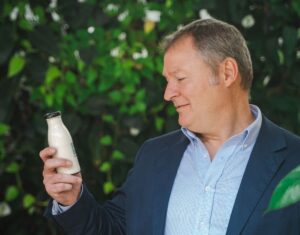
Jim Fader, cofounder and CEO, Eden Brew: There is too much tech-push and not enough customer-pull in alt proteins, so I’d like to see the industry focus more on great food experiences – employ ‘foodies’ and create products customers will buy because they are amazing. Focus on health as a key customer driver and let the environmental and animal welfare benefits serve as icing on the cake. Curious customers who become disappointed with their first trial are 10x harder to win back. Poor product = category damage.
Bryan Tracy, founder and CEO, Superbrewed Food: Breaking through investor unease keeps me up at night. The stalled commercial progress of large food-tech investments made in ’20 through ’22 is likely to persist in 2024. Companies and products that are prepared to scale in production and market likely have an increasing headwind to cut through.
Frank Jaksch, CEO, Ayana Bio: What keeps me awake at night is the media’s increasing scrutiny of ultra-processed foods, which are a necessary evil to feed the expanding population and will need to become part of the solution. Optimistically, I see this trend converging with the White House’s focus on ‘food as medicine’ and the two forces will push companies to build more health benefits directly into processed foods, and in new ways in 2024.
Mark Warner, founder and CEO, Liberation Labs: Fundraising has been the primary headwind over the last year and is the tail that wags the dog in the current environment. It is an obstacle, but not an excuse. There is still ample funding for quality ventures that can show a credible plan with a realistic path to near term positive cash flow.
Benjamina Bollag, founder and CEO, Uncommon: I believe my role is to bring things together while helping solve the biggest challenges and therefore what often keeps me awake at night is optimization. Each challenge by its own is easily surmountable; however it’s bringing everything together in the best way that I see as the most important part of my role. Scaling cultivated meat is extremely complex and whether it’s the best optimization of cell lines, media, process etc. or my time (between fundraising, hiring, internal ops etc.), optimization is always the challenge.

Dave Brown, COO, Chinova Bioworks: It feels like a lot of people around the world are exhausted by the stress of all of the major challenges we’re faced with on this planet. We can’t become complacent and no matter how tiring it is to keep pushing for bettering the food industry we have to do it.
Krijn de Nood, cofounder and CEO, Meatable: One of the biggest hurdles is regulatory approval, not just for us but the entire industry. Other hurdles include scaling and consumer acceptance. One way the industry can evolve to meet these challenges is through combining cultivated meat with plant-based, enabling these products to reach a wide consumer group and lower costs.
Adam Yee, cofounder and CTO, SOBO Foods: I’ve been pretty bummed out hearing about all of my friends, colleagues and past interns, who are all amazing technologists in food tech startups, getting laid off due to the funding environment. I wish I could hire all of them, and sometimes I ask them to help me in the lab, really to just catch up. I hope the dissemination of talent will overall, make the food industry more robust.
Shannon Hall, cofounder and CEO, Pow.Bio: What’s keeping us up at night? The macro concerns that underpin the need for biobased/sustainable solutions are still very big issues; climate issues, feeding the growing world population and political instability are as intense as ever. We feel that urgency to get more done faster, to make tangible impacts. And, it is a hard economic environment, which means that teams have to be very resilient to drive success and to not die, and even so some great ideas and projects will get shelved.
Andre Menezes, cofounder, Next Gen Foods (TiNDLE): The biggest challenges are around consumer education around the fundamental issues with animal farming, plus the path to gaining widespread adoption of plant-based habits.
Shir Hait, head of operations, Phytolon: Hiring and timelines for regulations in Europe are two of the major challenges we have been tackling. Developing innovative products via innovative approaches requires teams with a unique set of skills that might be scarce and hard to find, and efficiency of the regulatory processes in the major markets to adopt innovation in the food markets.
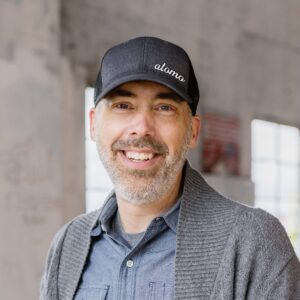
Joshua March, cofounder and CEO, SCiFi Foods: Overall we’re really excited about the huge progress we’ve made in getting towards commercialization of our first product, and are feeling good about the US regulatory environment. But there’s no doubt that the funding market is tough out there, and I expect there to be a lot of casualties in the cultivated meat industry as a result.
Timothy Wannier, cofounder, Wild Microbes: I’m worried about a pullback in corporate investment in alternative foods and proteins. We want to go deep looking for solutions, and I’m worried about the potential for a cycle out of biotech focus as R&D dollars become more constrained.
Ricky Cassini, cofounder and CEO, Michroma: Despite the promising potential of precision fermentation and synbio, several challenges remain, including regulatory uncertainty, consumer acceptance, and cost competitiveness.
Mohammed Ashour, cofounder and chairman, Aspire: The macroeconomic outlook remains challenging, placing a premium on capital and reinforcing the need for financial discipline and rigorous execution. At the same time, the urgency around climate-positive solutions has never been greater, and therefore, demands for profitable business models that deliver meaningfully against climate objectives will remain strong.
Dr. Nathan Pumplin, CEO, Norfolk Healthy Produce: The funding environment keeps me up. As funding has dried up from recent highs, startups are now forced to rethink the type of runway that is possible before becoming profitable businesses. I remain hopeful that this development will serve to accelerate time to market for innovative products.

David McElroy, CEO, Green Bioactives: I’m both excited and terrified about how we keep up with customer demand over the coming years as we are working on some exciting co-development projects in this space which could come with huge demand should we be successful.
Andy Kleitsch, cofounder and CEO Atomo Coffee: We set out every day needing to accomplish the impossible with less money, resources, and time than an established company. There is less room for error, therefore it is almost more important we choose what not to focus on vs. where we will put our effort.
Luke Young, cofounder and CEO, ALORA: As an industry whose prices reflect the stability across the world, the precarious sentiment and extreme stances outside of the common Overton window are powder kegs waiting for a match.
Maria Cho, CEO, Triplebar: What keeps us up at night is thinking about how we are going to feed the world by 2050. More specifically, how are we going to shift adoption of foods produced through biology into mainstream consumption at cost points that are reasonable and sustainable?
Amos Golan, founder and CEO, Chunk Foods: From a business and sales perspective, the plant-based industry has been stagnant in the past few years. This has been mostly due to products that were not delivering on experience or not priced properly, coupled with what I believe to be the wrong messaging and launch approach. My mission for 2024 is to make sure Chunk crosses the chasm into the mainstream US foodservice channels, which includes a combination of scalability, distribution, funding, and hiring.
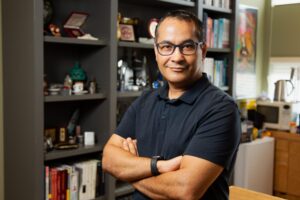
Alan Hahn, cofounder, MycoTechnology: The state of the economy, climate change and global supply chain disruptions are major concerns that continue to impact the food industry, including the unstable plant-based landscape. Our focus is on reducing/eliminating global supply chain constraints and sourcing as domestically as possible. Significant shifts are needed to overcome these hurdles and support long-term success for plant-based foods.
Eben Bayer, cofounder, Ecovative: MyBacon is a great product, we have figured out how to grow organic mycelium in farms at scale, now we need to get great at doing that over and over around the globe and closing what our Board member Gary Hirshberg refers to as the “the most important 18 inches” from the plate to the mouth! For us this means taking everything we figured out how to do — from wood chips to bacon— and engaging partners at scale for the next turn of the crank: farms outside of ours to grow, co-manufacturers to expand our bacon production, and of course, retailers and food service partners to help on the last 18″ While [mycelium-based textiles platform] Forager is about a year behind MyForest commercially, the challenges are similar, in that they look more like logistics and execution, and less and less like science and engineering.
Timothée Boitouzet, founder and CEO, Woodoo: Woodoo’s problem isn’t finding its market, but rather figuring out how fast we can grow to meet the increasing demand we are starting to see.


